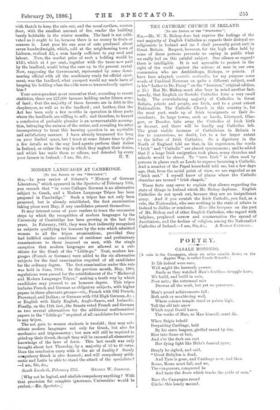MODERN LANGUAGES AT CAMBRIDGE.
[To THE EDITOR OF THE "SPECTATOR.'] Sin,—In your review of Scherer's " History of German Literature," which appeared in the Spectator of February 13th,
you remark that "in some Colleges German is an alternative subject to Greek, and a Modern Language Tripos has been proposed in Cambridge." Such a tripos has not only been proposed, but is already established, the first examination taking place next May, if any candidates present themselves.
It may interest some of your readers to trace the successive steps by which the recognition of modern languages by the University of Cambridge has been growing in the last five years. In February, 1881, they were first indirectly recognised as subjects qualifying for honours by the vote which admitted women to all the tripos examinations, provided they had fulfilled similar conditions of residence and preliminary examinations to those imposed on men, with the single exception that modern languages are allowed as a sub- stitute for the Greek of the "Little-go." Next, modern lan- guages (French or German) were added to the six alternative subjects for the final examination required of all candidates for the ordinary degree. The first examination under this rule was held in June, 1884. In the previous month, May, 1884, regulations were passed for the establishment of the " Medimval and Modern Languages Tripos," making a tenth way by which candidates may proceed to an honours degree. This tripos includes French and German as obligatory subjects, with higher papers in three alternate groups—viz., French with Old French, Provencal, and Italian ; or German with Old High German, &c. ; or English with Early English, Anglo-Saxon, and Icelandic.
Finally, on the 11th inst., the Senate voted French and German as two several alternatives for the additional mathematical papers in the "Little-go" required of all candidates for honours in any tripos.
The net gain to women students is twofold ; they may sub- stitute modern languages not only for Greek, but also for mechanics and trigonometry ; but men will still be required to grind up their Greek, though they will be excused all elementary knowledge of the laws of force. This last result was only brought about last Thursday, by a majority of 53 to 49 votes. Does the conclusion carry with it the air of finality ? Surely zompulsory Greek is also doomed; and will compulsory arith- metic and Latin be able to stand the attack of the specialists ? —I am, Sir, Sze.,
South Lambeth, February 17th. GEORGE W. JOHNSON.
[Why not be logical, and abolish compulsory anything ? With that provision for complete ignorance, Universities would be perfect.—En. Spectator.]


































 Previous page
Previous page